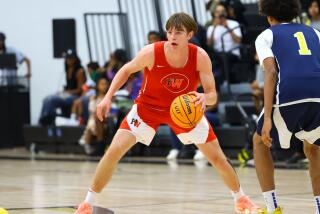Championship Season : Educators Question Meaning of Academic Decathlon Titles
- Share via
Taft High School’s victory in the United States Academic Decathlon earlier this month touched off an unprecedented public clamor.
Cheering crowds greeted the nine-member Woodland Hills team’s triumphant return from Rhode Island and warmed the hearts of educators long concerned that sports has overshadowed academics on school campuses. And the victory bandwagon grew crowded in the ensuing days as dignitaries and celebrities sought to share the team’s spotlight.
The Taft team’s success “speaks very highly of the school and its emphasis on academics,” said Jane Pollock, coordinator of the annual competition for the Los Angeles Unified School District. Dan Isaacs, superintendent of the district’s High School Division, said: “This shows the kind of education that is possible in our district.”
Classroom Hotshots
Yet no sports fan would interpret a high school football team’s championship to mean that all of the winning school’s students are big and fast, educators said. And no one would argue that an academic decathlon championship means that all of the school’s students are classroom hotshots.
Amid the hoopla over what began as a local event 21 years ago and has since grown to the level of an unofficial national championship, the true significance of the championship and of academic competitions in general remains unclear.
Some of those involved in the academic decathlon worry that the increasing recognition will boost the already considerable pressure to produce winners. And others raise concerns that the effort to win diverts resources--and attention--from the vast majority of students who do not compete.
Although some backers of the competition say the accolades send a powerful signal that raises all students’ interest in academics and demonstrates a school’s effectiveness, others are less sure.
“People have an image of William Howard Taft High School because of the Academic Decathlon . . . but it really doesn’t assess the entire school,” said Arthur Berchin, the well-dressed former university administrator who coached the Taft team. “Nine of these remarkable students don’t make a school.”
David Tokofsky, who coached a team from Marshall High School in Silver Lake to the 1987 national championship, was more blunt: “The system didn’t do it. Art Berchin did it with nine kids, and they did it outside the system. It doesn’t mean good things are happening in the classrooms of Taft, and it doesn’t mean it’s happening in the 53 high schools in the district.”
Nonetheless, the enthusiastic support for the Taft students gave prominent display to an academic accomplishment. The team members were conquering heroes for besting 37 other teams with their knowledge of 19th-Century American literature and European painters, advanced high school math, science, social studies and arcana related to the American presidency.
‘Starting to Get Prestige’
“It means that the intellectual part of school is starting to get the prestige that the athletic part has had since the 1900s,” said Robert Peterson, the longtime Orange County superintendent of schools who started the Academic Decathlon as a local competition in 1968.
“It thrills me to go into the muscle palace . . . and have it used for something academic,” he said, referring to the decathlon’s Super Quiz finals in which teams went head-to-head to answer rapid-fire questions in a gymnasium.
After their return, the Taft team members were swept through a week of interviews, assemblies, testimonials and an appearance on “The Tonight Show With Johnny Carson.” A visit to the White House may yet materialize, and a May 22 trip to Sacramento to receive honors from Gov. George Deukmejian and the Legislature is also planned.
And enthusiasm for the event, and a growing number of other state and national academic competitions, continues to mount nationwide. There are plans to make the Academic Decathlon international, discussions are under way to sweeten the scholarship pot for local winners, and some predict a television network will buy the rights to broadcast next year’s finals.
“It’s catching fire,” said Alice Butler, who directs the gifted and talented education program for the Pasadena Unified School District and coordinates its academic decathlon efforts. “All of a sudden, it has name recognition and everybody knows what it is, like everybody knows what an Eagle Scout is.”
The competition--which includes written tests in economics, fine arts, language, literature, math, science and geography; an essay, an interview and two speeches in addition to the Super Quiz--was conducted statewide for the first time in 1979 and became a national event in 1982. It is unique among major national competitions because its rules require that three members of each team have an A grade average, three have a B average and three have a C average.
Based in Cerritos
Interest in academic decathlons may be greater in the Los Angeles area since the state and national events are run out of an office in Cerritos.
The Los Angeles Unified School District has 53 teams that compete each November in the city competition, for which preparation begins almost a year earlier. Those hoping to become part of the decathlon team enroll in a special spring semester class, coaches earn a $1,653-per-semester stipend just as athletic coaches do, and team members spend hundreds of hours during summers and before and after school studying for the event.
Coaches try to get as many students as possible interested in the competition, sometimes personally persuading students they believe will do well to take part. Most team members are selected because of their performance in the academic decathlon class, which covers materials likely to come up during the competition.
The school district first began participating in 1981, and successful teams--Los Angeles teams have won the state championship the past three years and the national championship two of the past three--and charismatic coaches have kept interest alive.
The Taft victory “doesn’t mean that our school district can accomplish great things,” said Phil Chase, the coach of the academic decathlon team at George Washington Preparatory High School in southwest Los Angeles. “It does mean that in our district, it’s so competitive that when a team wins the city competition, they are the favorite in the state and the nation as well.”
Skipping Classes
Chase said some coaches allow team members to skip regular classes during the crucial weeks before the contest. And several other coaches said that if college scholarships are added as rewards for local success, additional pressure and even some cheating could result.
But USC education Prof. David Marsh said the problem in many California schools is not too much competition. “I think . . . in California we have too much of an opposite problem--too much complacency.”
Eighty teams representing other school districts in Los Angeles County compete separately, sending their own champion to the state decathlon in March. At some schools, decathlon teams earn the same recognition as sports teams.
Torrance’s West High School runs a picture of its academic decathlon team in the program for the school’s homecoming football game. Wilson High School in Hacienda Heights prints a full-color picture of the decathlon team as a yearbook center fold.
The recognition communicates to parents and students that a school values academics, several educators said. And the positive publicity that results from doing well in the competition provides an additional boost.
“When you have this kind of attention paid to the decathlon team, it comes to symbolize something good and worthwhile,” said Richard Sholseth, who coordinates the competition for Los Angeles County. “It’s symbolic, but it’s a healthy symbol.”
The symbolic value of a decathlon victory has not been enough to convince several large Los Angeles County school districts, including Long Beach and Glendale, to participate.
Few Students Involved
The principals at Glendale’s three high schools decided not to participate in the county’s competition, said Donald Empey, the district’s deputy superintendent for instruction, because “when it is all said and done, there are just a few students who are involved.”
“It would take a great amount of effort, and they didn’t know whether there would be that much real value to the students who didn’t participate,” Empey said.
“One of my concerns about any competition is that it tends to be exclusive and tends to leave out a fairly substantial part of the population,” said Charles Duke, chairman of the department of secondary education at Utah State University in Logan. “There is a real danger . . . that if there isn’t some balance, what you end up with is almost the same thing as you end up with in varsity athletics. A small group of students gets all the recognition and exposure, and a large group tends to remain unrecognized.”
That was also the concern of a successful coach at another San Fernando Valley school, who asked not to be identified. “It’s real sad,” she said. “There’s so many kids who don’t get the attention they need. I wish I could do for every student in my classes what I do for” those in the competition.
State Supt. of Public Instruction Bill Honig is a lukewarm supporter of academic competitions.
“Collective action toward a common goal is even more powerful” than individual or team competition as a motivator, he said. “The idea is that all of us in the state . . . are going to work until we get all the kids at the level they should be at.”
Coach Skeptical
Daniel Spetner, a highly successful coach at Dorsey High School in South-Central Los Angeles between 1981 and 1987, said it was always his dream that Dorsey’s considerable decathlon success would inspire non-participants. As many as 500 Dorsey students would attend dinners to honor the decathlon team, but Spetner said he is skeptical about whether the apparent interest resulted in greater academic effort or success.
Dorsey’s 1987 team finished in the top 10 in each of the 10 decathlon events. That team studied day and night, getting visits 14 times at Dorsey High School from police who responded when the school’s burglar alarms were touched off during nighttime sessions, he said.
“It would be impossible for kids to get any more out of public education than did the 1987 team,” Spetner said. Two of the team members attend Stanford University, and every team member raised his or her college aptitude test scores by at least 150 points.
“But that was just for six kids, and I really don’t know . . . what the effect was on the entire school,” he said. “If anything, it was a psychological effect because they proved that it could be done.”
Ann Joynt, executive director of the United States Academic Decathlon, argues that the competition’s benefits do spread to non-participants.
“It’s healthy and wonderful for everybody,” she said. “Take a kid even in the remedial-level class. . . . If he can sense that there are good, positive educational things going on in that school, then he becomes a part of it. The message is that learning is fun.”
Everything else aside, a team’s success is dependent on the motivation of team members. And that is a lesson that educators agree does apply to all students.
Shawn Canter, one of the Taft team members, said: “You could have a Nobel laureate from Harvard sit down in front of 20 kids and give the best lecture in the world on nuclear physics and, even if they had the potential, they wouldn’t learn it if they didn’t want to.”
More to Read
Get our high school sports newsletter
Prep Rally is devoted to the SoCal high school sports experience, bringing you scores, stories and a behind-the-scenes look at what makes prep sports so popular.
You may occasionally receive promotional content from the Los Angeles Times.






